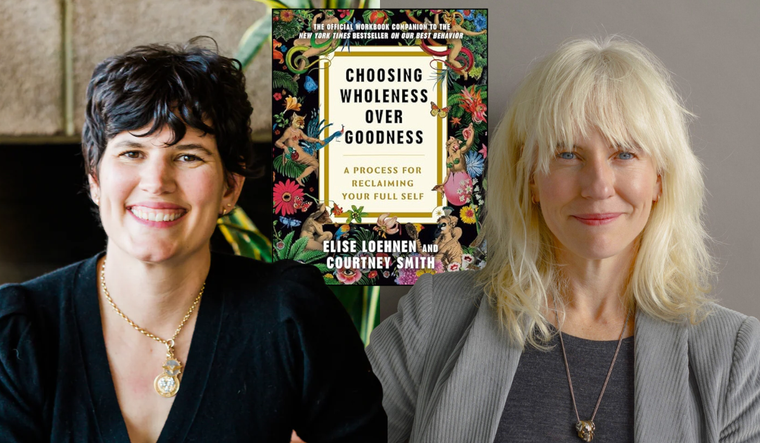The Lesson Is in the Mask
The coronavirus pandemic stopped society in its tracks. No one could have predicted the utter devastation that would ensue a little over a year ago. Life, in many ways, was just life. There were the usual conflicts, personal struggles, upsets, and setbacks, but all of these could be either worked through or pushed to the side. If you lost a job, there was the hope you could find a new one if you just followed the rules. If you lost a relationship, you could reconnect with some friends and get back into the field. If you gained an unwanted fifteen pounds, there was that nutritionist someone recommended and a long list of workout gyms you could attend in person. Life wasn't easy for many people, but there was some other option at your fingertips that made it easy to look past the core problems, and to make excuses for them. But with the coronavirus, the distractions stopped and the metaphorical mask we put on to face the world was replaced with a literal one.For many people, the mask is literally uncomfortable. It upset life as you saw it and as you wanted it to be. You had to put it on in a setting where you normally could just be what you perceived as your true self, and free in your approach in social or work settings. You may have complained that it was hard to breathe, hard to talk, hard to connect. And it was only when you were by yourself, in the safety of your home or with a few trusted individuals that you could take it off, and finally return to normalcy.As we look back on this past year and the lessons it taught us, there is good and there is also a lot of bad. But for many people, the lesson has been in the metaphorical mask, and not the literal one.In many ways, the metaphorical mask and the literal mask are opposites to one another. With the literal mask, you feel like you can't communicate authentically, if you don't have one you won't have a seat at the table, or you will somehow be shamed. It is for these same reasons that you put on a metaphorical mask. In many ways, it serves as extreme protection for your insecurities, and without one, you are a target. You may use anger as your mask, because you want to seem more manly and not expose that you have been hurt. You may use criticism as one of your masks, because you are afraid if you aren't dishing it out, someone may criticize you. There are negative and positive masks, but in general, it is a projection that in the end, isn't actually who you are.So, how do we figure out when we put on a mask? Well, just like the literal mask, we put on a metaphorical one when something makes us uncomfortable at our core. It is a way to hide a part of yourself that you won't to protect, want to project, or want to deflect. The metaphorical mask serves as a defense mechanism so we feel accepted by others, but also, by ourselves. And we can figure out our masks by how they fundamentally make us feel.We are all able to intuitively respond to a situation with basic feelings. The problem is, many times, that we hide our reactions. If a situation drains you, makes you nervous, makes you feel sad, angry, or shame, you will feel those emotions intensely. Most of these emotions come from some wound we have acquired throughout the years, and the situation you need the mask for brings it to the forefront of your feelings. This is where distractions serve as a great way to never address this wound, and to move on with your life like everything is fine.And as the literal mask, is in fact, safer, we have been forced to face situations that actually betrayed our true emotions, our true hopes, and our true dreams. As I put on a mask to face the world, I was forced to rip off my metaphorical one and look at the parts of myself that would have been much nicer to cover up. What I tried to run from showed right up at my door, and there was no where to go but to sit with them. Because the world stopped, I had to stop, and in doing so realized the many masks I was wearing were not who I was at all, and the discomfort I distracted myself with followed me wherever I went. But the most ironic part is that while I thought I was wearing these masks to be accepted by other people, I was really just trying to be accepted by myself. And when I told my true friends the realizations about myself after I took the mask off, they responded by telling me that was how they always saw me anyway.Since I went to Georgetown, a career in politics made sense. It was what I was supposed to do. If I wanted to be successful, I had to be well-known. If I looked at people who were well known in Republican politics, they were aggressive, opinionated, and bleach blonde. These were all masks I could put on and once I achieved these goals, I would be happy. And since there was always another mask I could add to my collection, there was no need to take inventory if the masks I already had were starting to clutter my spirit, and who I really am at my core.But when I thought about going back into politics, I always felt a pit in my stomach. It was confusing, because it was a career I thrived in, but it was also a career that caused great frustration. And while it may not be the actual political system, it definitely is the energy that currently surrounds it. I realized that in my ideal world, I would really be in a more creative field. Through this pandemic's limitations, I have found myself instinctively going back to writing over politics. Because there was no distraction, I went right to what brought me joy without fooling myself into something different. The mask came off, and my true self was already waiting. The most uncomfortable part, you realize afterwards, was wearing the mask that wasn't aligned with yourself to begin with. But the very concept of taking it off, of exposing yourself and the negative emotions that could accompany the process, is why many people refuse to do it in the first place.The road to happiness and fulfillment requires a deep dive into who you are at your core. It requires you to confront self-limiting beliefs, and in many ways, decide to stand up for yourself. It requires you to look at a situation that normally you would have thrown a mask on for, and instead, decide to walk in a different direction that doesn't require a mask at all. It requires a lot of strength that if time didn't stop, wouldn't have seemed worth the effort. It requires a self-evaluation that with distractions, wouldn't seem necessary. And it requires a self-love that with so many masks, you may have forgotten you even have. It takes a certain type of bravery to expose your true self and the failure that my come with it. With such an attachment to how you face the world, it may have been easier to confuse where the actual source of the problem lies.What truly brings you joy? If no one was around, and no one was there to judge you, what would you really be doing? What would your life look like, feel like? The time is now to ask yourself these tough questions, and the time is now to put on your literal mask, but rip off your metaphorical ones. Trust me, you won't regret it.This essay was featured in the April 11, 2021 edition of The Sunday Paper. The Sunday Paper publishes News and Views that Rise Above the Noise and Inspires Hearts and Minds. To get The Sunday Paper delivered to your inbox each Sunday morning for free, click here to subscribe.
Please note that we may receive affiliate commissions from the sales of linked products.



